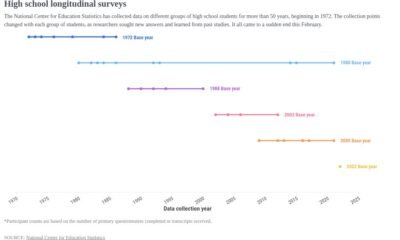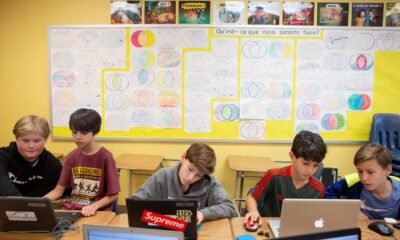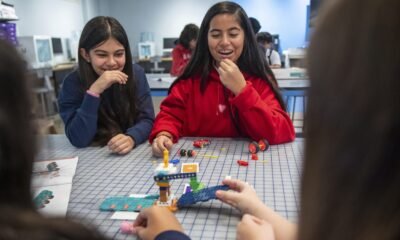Education
Our education system continues to under-deliver civic education for the very students most committed to improving their communities and our democracy

When Black youth appear in public conversations about civics, it’s usually in the context of disparities: whether it’s lower scores on the NAEP Civics assessment, underfunded schools or limited access to high-quality civic education.
These are real, urgent issues. But they are only half the story.
Black youth are frequently among the most civically engaged young people in the country, yet they are too often absent from conversations about civic excellence.
While it is true that only about 10 percent of Black eighth graders scored at or above proficiency on the last NAEP Civics assessment, it isn’t because they lack civic values or leadership potential.
It’s because they often attend schools where civics has been deprioritized, crowded out by preparation for high-stakes testing in other subjects or flattened into textbook worksheets that erase the very histories and voices the students live and breathe.
As we approach the 250th year of America’s national origin story, there’s another truth that we need to recognize: Black youth do engage in civic action. They protest. They organize. They show up at town halls, write petitions, push for change and go with their parents to vote at higher rates than their peers.
Black teens were more likely than their peersto engage in nearly every form of civic action measured, according to the State of Young People 2024 Research Report.
And they’re not just participating — they believe in their ability to make change. Forty-two percent of Black youth say they believe there are ways they “can have a say in what the government does,” compared with only 29 percent of other young people, the report found.
Related: A lot goes on in classrooms from kindergarten to high school. Keep up with our free weekly newsletter on K-12 education.
This paradox — high civic engagement despite limited civic learning — demands our attention. It is a story of both brilliance and neglect.
On one hand, it shows that Black youth are inheritors and innovators of a long tradition of civic activism, rooted in resilience, community and justice. On the other hand, it reveals how our education system continues to under-deliver for the very students most committed to improving their communities and our democracy.
This paradox prevents Black students and their peers from accessing the kind of comprehensive, community-based civics that would prepare them to steward democracy in their local communities even more effectively, not only for today, but for America’s future.
If we continue to view and evaluate civic readiness predominantly through test scores and student participation in formal instruction, we will miss the extraordinary civic leadership that already exists among Black youth. Worse, we risk reinforcing outdated narratives that reduce this highly engaged demographic of students to data points, ignoring their public contributions and the lived wisdom they demonstrate every day.
Organizations like Democracy Prep Public Schools, a national network of pre-K to grade 12 tuition-free public charter schools, and the nonprofit Generation Citizen offer a more expansive understanding of civic education — one that affirms the agency, insight and leadership already present in communities historically excluded from full civic participation. Generation Citizen works with over 33,000 middle and high school students annually through community-based civics programming that empowers them to understand their communities and take action to improve them. Students identify local issues, develop policy proposals and present their ideas to public officials.
The outcomes are real: Democracy Prep alumni were 16 percentage points more likely to register to vote and 12 percentage points more likely to vote than comparable peers who didn’t attend the network, a peer-reviewed longitudinal study found. Generation Citizen’s impact evaluation has found that 90 percent of its students report an increased adoption of civic skills as a result of their civic learning experience.
All students deserve a civic education that equips them to understand and shape the world around them; however, when Black youth — who are often denied such opportunities — gain access to rigorous, affirming civic learning, the transformation is especially profound.
We must expand our definition of civic excellence and access to civic education. Civic participation is not just about what you know — it’s also about what you do, what you believe and how you show up for your community.
The metrics, curricula and education policy priorities in the U.S. should reflect this understanding by supporting project-based civic assessment, fully funded state-issued civic seal programs that recognize students for demonstrated civic readiness and money for teachers’ professional development.
Related: COLUMN: Students want more civics education, but far too few schools teach it
At a time when political polarization and distrust in public institutions are reaching new heights, we need to take commonsense steps to ensure that students in every community can access high-quality civics. We also need to invest — systematically and sustainably — in civic education for historically marginalized communities.
This means more than adding a unit on the branches of government. It means implementing culturally responsive, participation-driven civics that equips students with the tools and confidence to make change.
It means funding civic internships, student leadership councils and school-based organizing opportunities. It means listening to students who are already leading and supporting them with the tools needed to go even further.
Black youth are not waiting to be empowered — they’re already leading. Schools can — and must — rise to meet them.
Rashid Duroseau is the senior director of Civic Learning at Democracy Prep Public Schools, a public charter school network with locations in New York City, San Antonio and Las Vegas. Andrew Wilkes is the chief policy and advocacy officer at Generation Citizen, a national civic education organization.
Contact the opinion editor at opinion@hechingerreport.org.
This story about civic education was produced by The Hechinger Report, a nonprofit, independent news organization focused on inequality and innovation in education. Sign up for Hechinger’s weekly newsletter.
Education
Schools Forced to Redefine What Cheating Means Amid AI Use

Published: September 16, 2025
By India McCarty
AI makes everything easier these days, including cheating. As more students turn to the tech to help them in school, teachers have to redefine their concept of cheating on tests and papers.
“The cheating is off the charts. It’s the worst I’ve seen in my entire career,” Casey Cuny, an English teacher of 23 years, told the AP News. “Anything you send home, you have to assume is being AI’ed.”
EducationWeek reported that, in a survey conducted by Turnitin, “some AI use was detected in about 1 out of 10 assignments,” and that “at least 20 percent of each assignment [they reviewed] had evidence of AI use in the writing.”
Cuny continued, “We have to ask ourselves, what is cheating? Because I think the lines are getting blurred.”
Related: How AI and ChatGPT are Changing Education
Students agree, with many saying they turn to ChatGPT for help with brainstorming. However, it’s all too easy to take the chatbot up on its offer of simply writing the paper or doing the work for them.
“Sometimes I feel bad using ChatGPT to summarize reading, because I wonder, is this cheating? Is helping me form outlines cheating? If I write an essay in my own words and ask how to improve it, or when it starts to edit my essay, is that cheating?” college sophomore Lily Brown said.
She explained that there is a gray area when it comes to how teachers enforce AI restrictions — most syllabi say things like “Don’t use AI to write essays and to form thoughts,” but that leaves a lot of wiggle room for students who want to use the technology.
Now, schools work to put detailed rules about AI use in place, hoping to cut down on any cheating. The University of California, Berkeley emailed faculty with AI guidance that told them to “include a clear statement on their syllabus about course expectations” surrounding the tech.
The University of Kansas has also made their guidelines clear, with James Basham, a professor of special education and director of the school’s Center for Innovation, Design & Digital Learning calling the rules “a foundation.”
“As schools consider forming an AI task force, for example, they’ll likely have questions on how to do that, or how to conduct an audit and risk analysis,” he explained in an interview with KU’s newspaper. “The framework can help guide them through that, and we’ll continue to build on this.”
It can be tricky to decide what’s cheating and what’s just a little extra help when it comes to using AI, but as schools wise up, regulations for the tech use are becoming more widespread.
Read Next: Is ChatGPT Use Becoming More Common Among School Kids?
Questions or comments? Please write to us here.
Education
Seton Hall University Hosts Dynamic BAASANA Conference on AI and Society

Keynote speaker Issata Oluwadare addressing conference attendees
Over the summer, Seton Hall University welcomed global scholars, executives and students
for the 2025 International Conference of the Business and Applied Sciences Academy
of North America (BAASANA), positioning the university and its Division of Continuing Education and Professional Studies (CEPS) as leaders in convening high-level thought leadership events.
The two-day conference, themed “AI and Society: Navigating the Future of Technology
and Human Well-Being,” brought together voices from across academia, business and
technology to examine the promise and challenges of artificial intelligence. From
addressing ethical concerns to exploring the role of AI in education, leadership and
health, the conference underscored Seton Hall’s role as a hub for innovation, dialogue
and collaboration.
Jet Mboga, BAASANA president, opened the event by honoring the Academy’s founders
and longtime members before framing the conference’s urgency. “This theme could not
be timelier,” she noted. “As AI continues to transform industries and redefine relationships,
it is imperative that we critically examine its impact on human well-being and societal
structures. This gathering embodies BAASANA’s mission to bring innovation, intellectual
curiosity and social responsibility into focus.”
Conference highlights included an opening address from Berkeley College president
Diane Recinos on “Remembering the Human Side in an AI World,” followed by a student-led
panel on envisioning AI’s impact in higher education. The panel was moderated by John
H. Shannon of Seton Hall’s Stillman School of Business and featured Kathleen Meager ’25, Kyle Ganning ’25 and Nicole Voltmer ’26, who shared
their research findings from their intensive project Charting the Future of Higher Education, which they have presented to the university board and other audiences over the past
year.
Keynote speaker and Rutgers faculty member Issata Oluwadare explored Generation Z’s
social and workplace challenges in “Teaching Soft Skills to America’s Loneliest Generation,”
providing deep insight along with one of her students on how high-impact teaching
practices and empathy can engage Gen Z in ways that acknowledge the digital world
they grew up in, while fostering their talents, confidence and leadership development.
Breakout sessions delved into pressing questions on AI’s role in finance, healthcare,
marketing, leadership and education, with faculty and students from institutions across
the U.S. and abroad contributing research and perspectives. The breadth of presentations,
from deepfakes and social engineering to AI in human resource management and sustainability,
demonstrated the interdisciplinary reach of the conference.
Donald Crooks, BAASANA past president and professor emeritus of Wagner College, emphasized
the collaborative spirit at the heart of the event: “At BAASANA, we believe the intersection
of knowledge, innovation and community is where breakthroughs happen. This conference
was a testament to the power of collective expertise. The conversations here will
ripple outward, shaping how AI can be harnessed responsibly for the betterment of
society.”

Co-authors of the 2025 24-hour Hackathon research paper ready to present their findings
at the conference
Seton Hall played a key role not only as host but also as an active participant. Mary
Kate Naatus presented on AI’s potential to reshape global academic partnerships, noting:
“Hosting this conference with a strong student presence shows our commitment to being
a place where ideas are exchanged openly, where different perspectives come together,
and where those conversations spark innovation that reaches across industries and
borders.”
In addition, the conference featured Best Presentation Awards, with standout recognition
for Kendra Sherman, Seton Hall’s assistant director of residence life and doctoral
student in higher education leadership, for her research on international education
and AI. A paper emerging from the 2025 24-hour Hackathon, co-authored by Sandro Tejada,
Mark Schild, Manfred Minimair, Victor Lopez and Naatus, was also recognized, highlighting
Hackathons as catalysts for building a co-curricular culture of AI, cyber and innovation.
Reflecting on the initiative, Tejada shared, “This Hackathon is such an impactful
strategic initiative. It creates a space where students, faculty and industry leaders
can co-create solutions to real-world challenges while advancing research that has
immediate relevance.” Seton Hall will host its second annual 24-Hour Hackathon on
March 21 and 22, 2026 (more information available here).

Focused and Present: In-person Attendees at the 2025 BAASANA Conference
The conference was further shaped by the leadership of Margaret Laryea, a Stillman
master’s student in business analytics, who served as project manager and volunteer
coordinator for the event and noted, “This was a great venue for students to present
their work, gain feedback and build their professional networks.” Other Seton Hall
student presenters, including Janice Huang, demonstrated the university’s diverse
and growing talent, while international participants from Bangladesh and Nepal, including
Jahirul Haque, vice chancellor of the Canadian University of Bangladesh, helped expand
the dialogue around innovation and leadership around the globe.
Closing remarks from Wagner College president Jeffrey A. Doggett highlighted the need
for higher education institutions to address the reality of AI as it impacts the future
of work. Universities must prepare students to navigate within that evolving landscape,
understanding the technology, the benefits, the risks and to develop the ethical and
moral compass necessary to lead responsibly in an AI-driven world.
For inquiries on events and professional programming, as well as professional development
opportunities in AI, leadership and technology at Seton Hall, visit our division website or contact [email protected].
Categories:
Arts and Culture, Education, Nation and World
Education
Fong introduces AI Education Act of 2025 to strengthen America's workforce, global competitiveness in AI – The Ridgecrest Daily Independent

Fong introduces AI Education Act of 2025 to strengthen America’s workforce, global competitiveness in AI The Ridgecrest Daily Independent
Source link
-

 Business3 weeks ago
Business3 weeks agoThe Guardian view on Trump and the Fed: independence is no substitute for accountability | Editorial
-
Tools & Platforms1 month ago
Building Trust in Military AI Starts with Opening the Black Box – War on the Rocks
-

 Ethics & Policy2 months ago
Ethics & Policy2 months agoSDAIA Supports Saudi Arabia’s Leadership in Shaping Global AI Ethics, Policy, and Research – وكالة الأنباء السعودية
-

 Events & Conferences4 months ago
Events & Conferences4 months agoJourney to 1000 models: Scaling Instagram’s recommendation system
-

 Jobs & Careers3 months ago
Jobs & Careers3 months agoMumbai-based Perplexity Alternative Has 60k+ Users Without Funding
-

 Podcasts & Talks2 months ago
Podcasts & Talks2 months agoHappy 4th of July! 🎆 Made with Veo 3 in Gemini
-

 Education3 months ago
Education3 months agoVEX Robotics launches AI-powered classroom robotics system
-

 Education2 months ago
Education2 months agoMacron says UK and France have duty to tackle illegal migration ‘with humanity, solidarity and firmness’ – UK politics live | Politics
-

 Podcasts & Talks2 months ago
Podcasts & Talks2 months agoOpenAI 🤝 @teamganassi
-

 Funding & Business3 months ago
Funding & Business3 months agoKayak and Expedia race to build AI travel agents that turn social posts into itineraries

















